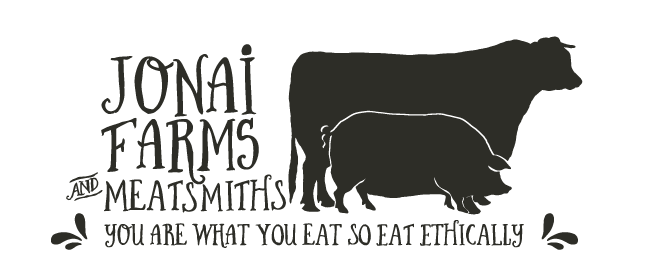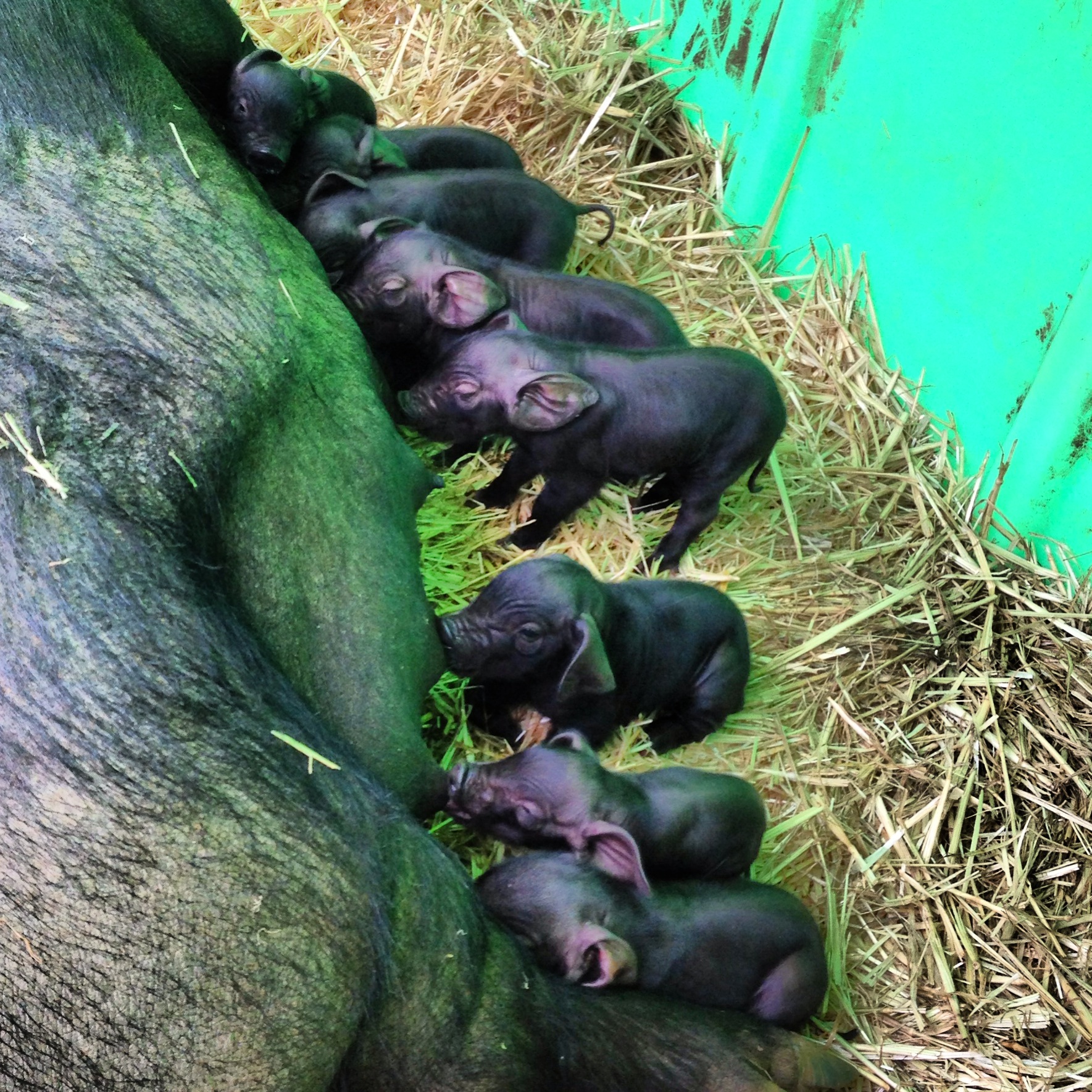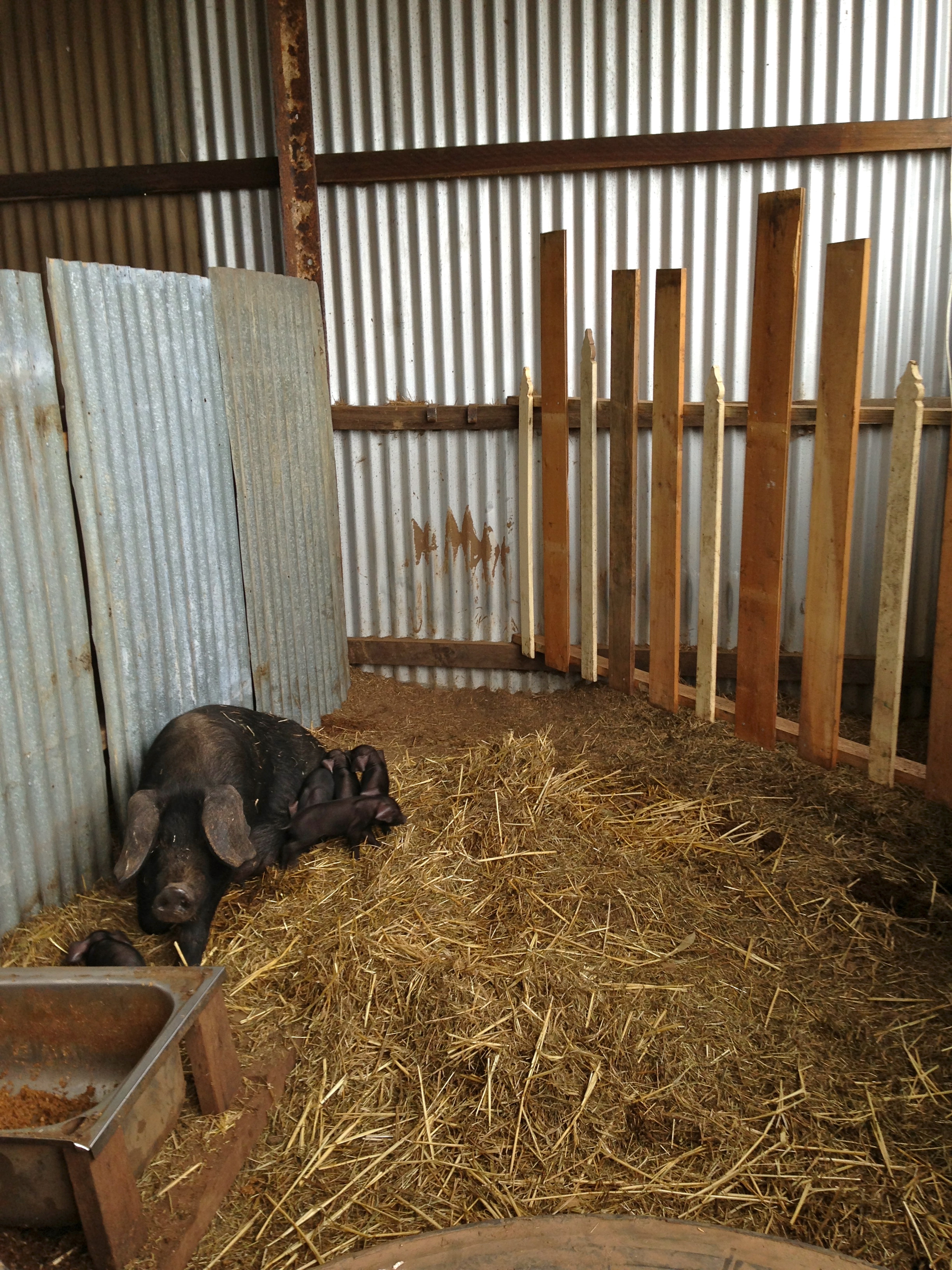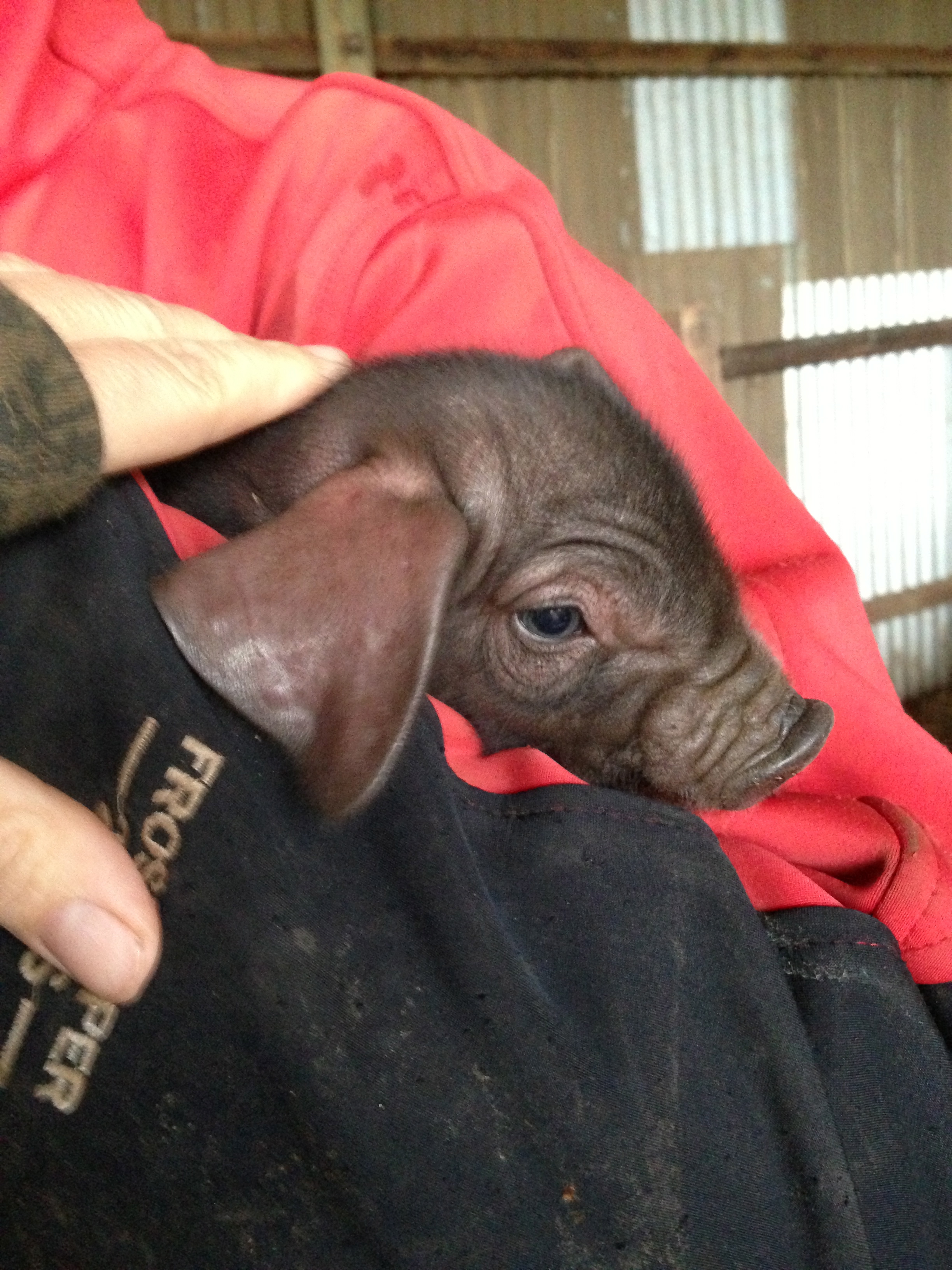Tammi:
Showing a vegan a photo of an adorable piglet and then asking them to help decide whether to castrate is undoubtedly a red flag to a bull. But it wasn’t vegans we were asking, it was omnivores. What some will call ill-considered (I did briefly), I will here defend as a serious exercise in transparency by farmers who want to educate the public about the realities of food production, and especially the raising of animals for meat. And my vegan friend Nathan and I will argue that vitriolic attacks on those of us committed to transparency create a perverse incentive to retreat to secrecy and obfuscation of regular food production management practices.
We’ve been farming free-range rare breed Large Black pigs for a year and a half now. We came from Melbourne with a clear vision to contribute to what we consider ethical farming - raising pigs on the paddocks who are free to root and wallow at will, and basically express what Joel Salatin calls ‘the pigness of the pig’ until they have ‘one bad day’, which they don’t even know is coming. We believe it’s morally right to eat meat, but not from animals who have suffered or been raised in close confinement their entire lives up until slaughter. Our views and farming practices are not especially controversial, and generally our efforts to raise animals for food humanely and with care and kindness are met with appreciation - both for our practices and for our openness.
So it seemed a great idea when Cameron Wilson of Radio National Bush Telegraph asked whether we were willing for them to do a series tracking one of our animals from piglet to Christmas ham. Too many people don’t know where their food comes from or how it’s raised, though the tide is hopefully turning as information is now more readily accessible and people are realising there’s a lot that happens from paddock to plate.
The idea is a monthly radio interview where we update listeners on what’s been happening with the pig, who we’ve called Wilbur 101 (we call all the boys Wilbur and all the girls Charlotte unless they’re our breeding stock, in which case they have individual names, such as Borg, Big Mama, Keen, Pink and Prudence…). Many people believe you shouldn’t name your food, but we take the view that we’d rather know the animal on our plate well than not at all.
Supplementary to each month’s interview, we agreed to allow a poll to be held to seek the public’s view on management decisions. It gives an opportunity to inform people of the multitude of issues and decisions farmers face daily, and we hoped that using a poll in addition to the podcast and information on the website would lead to more buy in from the public, and in turn more care about the type of system animals are raised in. The first question we posited (as it’s the first management decision we face with newborn boars) was whether or not to castrate.
Unfortunately, while the omnivorous public might have wanted to discuss the practicalities and ethics of castrating boars, a significant number of those opposed to eating meat joined the discussion and turned it into a rant against us, the ABC, farmers generally, and meat eaters specifically. We were called ‘sick freaks’, ‘Neanderthals’, and ‘animal abusers’, to name some of the milder insults.
Nathan:
There are a number of things worth considering here: namely, the ad hominem attacks, the issue of transparency, and the illusion that either veganism or vegetarianism are without their own set of complications, also linked to transparency.
The issue of ad hominem attacks, whether against Tammi and Stuart, the ABC, or meat eaters more generally, brings into question the motives of those willing to utter such comments as to what they are trying to achieve. Considered, respectful discussion is never going to be the effect, nor is any type of conversion from eating meat tenable if the basis of an antithetical argument is vitriolic abuse. Moreover, it lacks all credibility and illustrates a lack of knowledge and understanding not only of farming processes and practices, which is seemingly what this project is attempting to bring to light, but also appears to lack an understanding and knowledge of why people become vegans or vegetarians in the first place, or why people may 'de-convert' — a phenomenon equally present to the phenomenon of people becoming vegan or vegetarian.
All these considerations are not only deeply philosophical, but are also sociological, religious and political. If the conversion to veganism or vegtarianism is well considered, it would be charitable enough to expect that an argument against eating meat is equally considered; calling someone a 'sick freak' or 'Neanderthal' does not range in the category of a rationally considered argument.
Of course, the idea behind this project is transparency. While I as a vegan may disagree with the killing and exploitation of animals for various reasons, the kind of practices brought to light through this program are refreshing to see. In the wake of footage and articles that surround the practice of live export and animal abuse in abattoirs, the program undertaken here ought to be a welcome relief to vegans and vegetarians as we have farmers not only willing to transparently show how animals are treated, but also have public involvement. The outcome of transparency and public involvement is the basis of a descriptive set of guidelines and practices that can be adopted by all farmers. In effect, this program has the potential to become a national standard whereby consumers have the confidence to purchase animal products that have been treated in an ethical manner; whereby the ethical treatment of animals has been considered.
The issue of transparency and the ethical treatment of animals is also a problem for vegan and vegetarian foodways. The ethical treatment of animals is not just to be considered for the animals we can see, but also for the ones we don't. What consideration is there of the countless rodents and small marsupials that are killed through the processes of producing a loaf of bread? Are the numerous animals killed in the process of pest control of wheat crops, the storage of wheat and flour worthy of our moral consideration? What about the fish whose parts are used in the mass production of beer? Or what of the environmental cost of the global shipping of processed vegan and vegetarian food items? Is the environment also worthy of moral consideration to vegans and vegetarians?
Often the mistreatment and exploitation of animals and the environment is a symptom of a much larger problem. With the spread of global capitalism, the need to feed the starving, unemployed, underemployed and low waged is met with with cheap meat, dairy and eggs at the expense of animal well being. How does veganism approach the problem of starvation, unemployment, underemployment and low wage employment with highly priced soy products? While veganism can betray the maltreatment of animals through analytic critique, the sense in which veganism is able to confront issues of starvation, low wage, under and unemployment betrays itself as being unable to satisfactorily confront environmental and everyday living conditions; veganism requires a level of wealth and prosperity that isn't afforded to the underprivileged. While it is important to analyse and critique the way animals are treated within the global economic market in which we live, it is equally important to engage with farmers and producers willing to be transparent about foodways and the way in which animals are treated in a respectful and considerate manner, as well as being aware of the issues of transparency within our own vegan and vegetarian foodways.
Tammi:
All issues and concerns around the ethics of food production and consumption are worthy of discussion and open scrutiny, but when one group restricts itself to shouting the loudest abuse, or refuses to engage even marginally with the topic at hand (and makes it very unpleasant for any who do engage), there can be no winners - especially not farm animals.
Surely we can all agree that a farming community unwilling to share its practices with the public due to sustained, personal attacks by so-called ‘animal rights activists’ is a very bad outcome. We here at Jonai Farms won’t be frightened away from the challenge of transparency - we understand why people choose veganism or vegetarianism (I was a vegetarian for seven years, and write frequently on my blog about these very questions), and we quite simply disagree with that decision while respecting one’s right to make it. Vegans have every right to disagree with our position, of course, but should think long and hard about what can happen to our food system when they so zealously shout farmers off the stage.
Nathan Everson is currently undertaking a Masters of Research degree through Macquarie University, Sydney, focusing on the structural intersections between humans and animals and how these intersections form the basis of our conceptions of politics, ethics, and law. He is a vegan working with his wife and two children on self-sustainable practices within a suburban environment.




